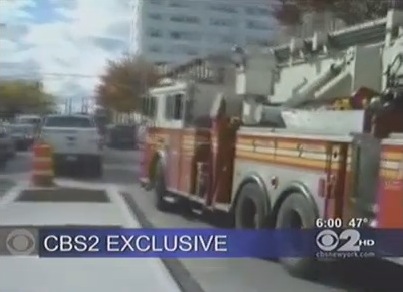
Here's something Marcia Kramer, Dov Hikind, and Marty Markowitz forgot to mention in all their accumulated lawsuit threats, media events, and TV coverage on the Fort Hamilton Parkway pedestrian refuges: FDNY and Maimonides hospital report that the project has not affected response times.
In opposing the pedestrian islands, designed to calm traffic and provide a safer crossing for Borough Park's large senior population, Kramer, Hikind, and Markowitz have attempted to wrap themselves in the banner of public safety. They claim that the islands make it difficult for emergency vehicles to traverse the road, slowing response times to nearby Maimonides. According to Maimonides itself and the FDNY, however, their vehicles are able to move freely and respond to emergencies as effectively as ever.
"As far as the hospital is concerned, there has been no issue with delivering care," Maimonides Assistant Vice President for Public Relations Eileen Tynan told Streetsblog. "Our ambulance drivers concur." If medical care is suffering as a result of the pedestrian islands, it's news to those providing care.
The FDNY similarly reported no problem with its fire trucks or ambulances navigating the redesigned Fort Hamilton Parkway and no threat to public safety. Said a fire department spokesperson by e-mail, "FDNY met with DOT regarding these 'pedestrian refuge islands' before they were installed. As with any project, any concerns would be discussed and fixed. I do not have any information that says our units cannot drive safely on Fort Hamilton Parkway." FDNY EMTs and paramedics respond to 1.2 million emergencies citywide each year, or three a minute.
Dov Hikind's office has not responded to requests for comment about the statements from Maimonides and FDNY.
One subset of emergency responders who may be influencing Hikind's opposition to pedestrian safety infrastructure is Hatzolah, the Orthodox Jewish volunteer ambulance service. Hatzolah has petitioned the local community board to ask the city to take out the refuge islands, according to CBS 2.
Hatzolah CEO Rabbi David Cohen said it was a given that the refuges slow emergency vehicles. "It will increase response times," he said. "You don't need a transportation maven to tell you." Cohen added that he didn't have any hard measurement of increased response times, only driver testimony, and that no one had died as a result of the supposedly slower Hatzolah service.
Cohen also brought up issues unrelated to emergency response, complaining that the refuge islands have made it harder for businesses to load and unload, and had slowed traffic for non-emergency drivers. "Quite frankly, it just increases driving times around," he said. "A bottleneck is bad anywhere, and when it's next to a hospital, that's doubly bad."
But the refuges have not removed any traffic lanes from the roadway, suggesting that any new traffic back-ups must be caused by double-parking, and the only effect on loading is that double-parkers cause inconvenience to the drivers behind them. It seems like Hatzolah, and the businesses Cohen spoke for, do not have a pedestrian refuge problem. They have a double-parking problem.





